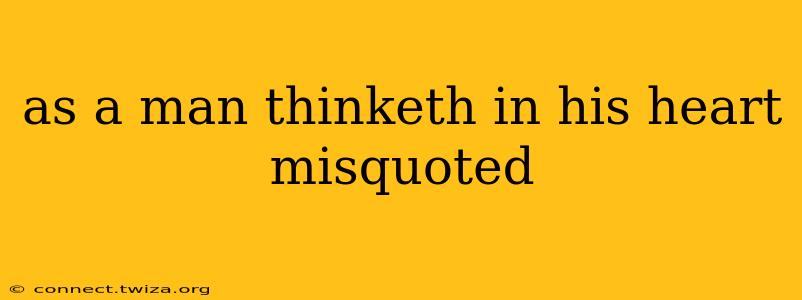James Allen's As a Man Thinketh is a short but powerful self-help classic. Its enduring popularity, however, has unfortunately led to several misquotations and misunderstandings of its core message. This article will explore some common misquotes, clarify the book's true meaning, and delve deeper into the principles Allen advocates.
What are some common misquotations of "As a Man Thinketh"?
One of the most prevalent issues is the simplification and alteration of Allen's nuanced ideas. While the core message – that our thoughts shape our reality – remains consistent, precise wording is often lost. Exact phrases are rarely quoted, and the overall meaning is sometimes diluted. Instead of precise quotes, interpretations and paraphrases proliferate, leading to a diluted understanding of the text. For example, you might see "as you think, so shall you become" used frequently, but this lacks the subtle power and context of Allen's original prose.
What is the actual meaning of the book?
Allen’s book isn't merely about positive thinking; it’s a profound exploration of the connection between thought, character, and circumstance. He argues that our dominant thoughts—our habitual mental patterns—directly influence our character, which in turn shapes our experiences and life outcomes. It's not about simply wishing for something; it's about cultivating a mindset aligned with our goals and aspirations. This involves conscious self-examination, identifying and transforming negative thought patterns, and focusing on developing virtuous character traits.
Does the book promote a solely positive thinking approach?
No. While the book emphasizes the power of positive thinking, it doesn't advocate for blind optimism or ignoring negative thoughts. Allen acknowledges the existence of negative thoughts and emotions, but he stresses the importance of understanding their origins and consciously choosing more constructive thought patterns. He emphasizes self-mastery and the cultivation of a strong moral character as essential components of a fulfilling life. The book calls for self-awareness and conscious effort in shaping our thoughts, rather than simply passively accepting whatever comes to mind.
How does the book relate to the law of attraction?
While As a Man Thinketh predates the popularization of the Law of Attraction, there are undeniable parallels. Both concepts emphasize the power of thought in shaping reality. However, Allen’s approach is more deeply rooted in character development and moral philosophy. He highlights the importance of ethical conduct and self-improvement as integral parts of manifesting a desirable life. The Law of Attraction often focuses more on the mechanics of visualization and affirmation, while Allen's work emphasizes the internal transformation necessary for lasting positive change.
What are the key takeaways from “As a Man Thinketh”?
The key takeaways from Allen's work are:
- Thought is the architect of destiny: Our thoughts shape our character, which, in turn, shapes our experiences.
- The importance of self-control: Mastering our thoughts is crucial for shaping a positive and fulfilling life.
- Character building is paramount: Ethical conduct and virtuous habits are essential for lasting happiness and success.
- Responsibility for one's life: We are responsible for our thoughts and their consequences.
- The power of conscious choice: We can actively choose our thoughts and cultivate positive mental habits.
As a Man Thinketh continues to resonate with readers because it presents a timeless message: we have the power to shape our lives through the cultivation of our thoughts. Understanding the book's true meaning, beyond the common misquotations, allows us to harness its profound wisdom and apply its principles to create a life of purpose and fulfillment. Remember, the emphasis isn't on simplistic affirmations, but on a holistic approach to personal growth and mindful self-improvement.
